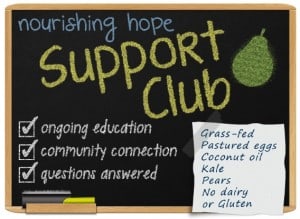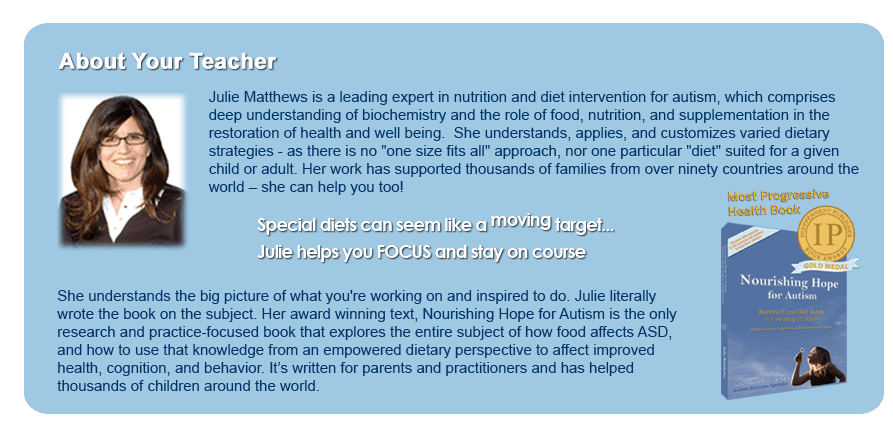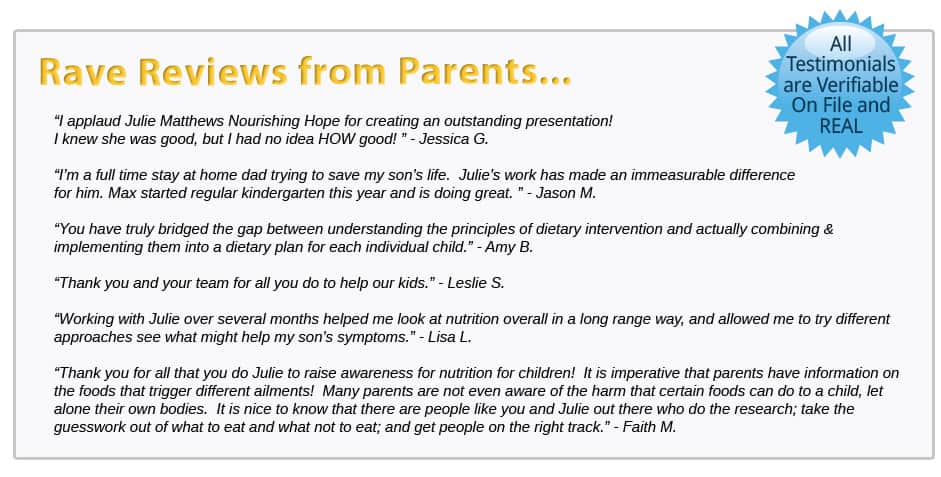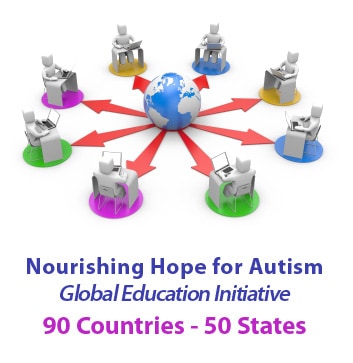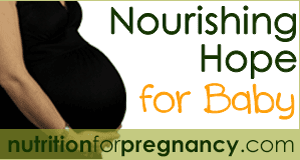
Topic-Specific Education for Parents


 Parents routinely struggle with their child’s attention, focus, mood or behavioral issues. It can be stressful, exhausting and overwhelming to constantly try to manage what in many cases are just symptoms of underlying nutritional issues. Many behavioral issues including autism, ADD, ADHD, Aggression, Anxiety, Bipolar Disorder, Depression, Developmental Delays, Learning Delays, Mood Disorders and Sensory Processing Issues can be greatly improved through dietary modifications. But dietary changes can also feel stressful, especially if you have a picker eater or limited time or financial resources. Fortunately, Julie Matthews can take the stress, uncertainty and anxiety out of the process.[/text_block]
Parents routinely struggle with their child’s attention, focus, mood or behavioral issues. It can be stressful, exhausting and overwhelming to constantly try to manage what in many cases are just symptoms of underlying nutritional issues. Many behavioral issues including autism, ADD, ADHD, Aggression, Anxiety, Bipolar Disorder, Depression, Developmental Delays, Learning Delays, Mood Disorders and Sensory Processing Issues can be greatly improved through dietary modifications. But dietary changes can also feel stressful, especially if you have a picker eater or limited time or financial resources. Fortunately, Julie Matthews can take the stress, uncertainty and anxiety out of the process.[/text_block]

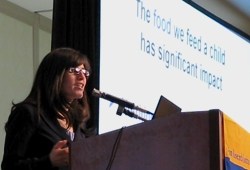 Julie simplifies the world of nutrition and dietary choices and arms you with manageable tools, strategies, shopping lists, recipes and expert knowledge to make successful dietary changes. She is an experienced nutrition consultant, conference educator, and a parent. Many families attempt to make dietary changes, such as eliminating gluten and dairy, or expanding the diet of picky eaters – only to run into small bumps in the road. Julie’s proven approach helps families successfully navigate those bumps and make a smooth transition to better nutrition. And, improved health learning, and behavior.[/text_block]
Julie simplifies the world of nutrition and dietary choices and arms you with manageable tools, strategies, shopping lists, recipes and expert knowledge to make successful dietary changes. She is an experienced nutrition consultant, conference educator, and a parent. Many families attempt to make dietary changes, such as eliminating gluten and dairy, or expanding the diet of picky eaters – only to run into small bumps in the road. Julie’s proven approach helps families successfully navigate those bumps and make a smooth transition to better nutrition. And, improved health learning, and behavior.[/text_block] 
- Learn about gut health and how food, diets, and supplements can help heal
- Understand the varied dietary approaches – research and efficacy: FODMAPS, SCD/GAPS, Failsafe, Low Oxalate diet, and more.
- Move beyond GFCF – food reactions that might trip you up or warrant diet modification
- Prepare Probiotic and Fermented Foods – how to use these strategically for your child’s healing
- Identify the right supplements – and get the best prices!
- Get good nutrition into Picky Eaters – success tactics employed with clients worldwide

 To help support families shifting to healthier diet and nutrition choices, Julie developed the “Nourishing Hope Support Club.” She provides detailed insight and personal experience in Topic Specific Learning Sessions that will help you improve your effectiveness at feeding your child the food that’s right for them.
To help support families shifting to healthier diet and nutrition choices, Julie developed the “Nourishing Hope Support Club.” She provides detailed insight and personal experience in Topic Specific Learning Sessions that will help you improve your effectiveness at feeding your child the food that’s right for them.
You’ll learn to hone and evolve your strategy, troubleshoot problem areas, and better ensure good nutrition while following any specialized diet.
Julie discusses emerging research, shares her clinical experience, answers your questions, and interviews special guests (on certain topics). You will learn to make the most of your food and supplement choices, identify possible pitfalls, and stay on track toward improving the health and learning potential of your child. Each Support Club Session includes content specific learning topics about how various diets, nutrition concepts, and supplements help children with ADHD, autism, sensory processing disorders, and learning and developmental delays.[/text_block]

Support Club education advances individual success with specials diets while increasing global awareness of this useful approach to helping children with ASD (and their families) improve health, learning, and behavior.
[/text_block]

“You inspired me to make the move to full GFCF… I could cry with gratitude. Your explanations made sense, your framework was logical, and your advice was rational. Thank you. Thank you. Thank you.”
– Valerie F.
[/text_block]

Each Session/Topic is 60-90 minutes
Audio-visual presentation, PDF slides,
Mp3 audio, handouts
[/text_block]

(further details below on all 26 available sessions)

• Behavior Challenges and Food
• The Gaps in GAPS?
• Oxalates and the Low Oxalate Diet
• Supplements for Children with ASD and more
• 25 Vegetables a Dozen Kid-Friendly Ways
• Gut Health: Special diets, foods, and supplements
• Understanding Additives: What’s in what you eat?
• Dietary Pitfalls: Get Unstuck[/text_block]

• Phenols, Salicylates, Amines and Glutamates
• EMFs and Toxins: How to Avoid Them
• Grain Free Diets
• Low Oxalate Cooking
• Combining Diets
• FODMAPs – Know about fermentable carbohydrates
• Allergen-free Travel
• Allergen-free School Lunches[/text_block]

• Food and Mood – Trudy Scott, CNC
• The Microbiome in Autism – Jack Gilbert, Ph.D
• Mitochondrial Dysfunction – Dr. Dan Rossignol
• Methylation Supplement Support – Dr. Kurt Woeller
• Why & How to Avoid GMOs – Tom Malterre, MS
• Nourishing Yourself while Helping Others – Dr. Amy Day
• All about Glutamate – Katherine Reid, Ph.D[/text_block]

GET immediate and unlimited access to ALL Nourishing Hope Support Club Sessions.
[/text_block]


Further Detail on the Individual Support Club SESSIONS

Supplements for children with developmental delays
[op_liveeditor_element data-style=””][text_block style=”undefined” align=”left”]
- The ins and outs of supplements for supporting the brain and body
- Research on the use of supplements
- Vitamins, minerals, fatty acids, amino acids
- What to look for in a good supplement, what ingredients to avoid
- Brand and product recommendations to make it easier to choose
[/text_block][/op_liveeditor_element]
[op_liveeditor_elements][/op_liveeditor_elements]

The Gaps in GAPS
[op_liveeditor_element data-style=””][text_block style=”undefined” align=”left”]
- What is the GAPS diet?
- The science behind the GAPS diet
- “Mistakes” people make and how to avoid them
- Common pitfalls to be aware of
- How are oxalates a factor?
- Are you eating too monay carbs?
[/text_block][/op_liveeditor_element]
[op_liveeditor_element data-style=””][text_block style=”style_1.png” align=”left”]
[/text_block][/op_liveeditor_element]
[op_liveeditor_elements][/op_liveeditor_elements]

25 Vegetables a Dozen Kid-Friendly Ways
[op_liveeditor_element data-style=””][text_block style=”undefined” align=”left”]
- Cooked and raw vegetables ideas, and crispy/crunchy suggestions
- Kid-friendly fermented vegetables options
- We will address texture, flavor, visual, and other factors that are important for picky eaters
- Ideas and recipes that spark inspiration and help create a more nourishing mealtime
- How to prepare good tasting vegetables that are “beyond the basics” and include: Brussels sprouts, rutabaga, boy choy, cabbage, and more!!!
- Ideas for ANY special diet-GFCF, SCD/GAPS,b low oxalate, Feingold/Failsafe, Paleo, FODMAPS, and Body Ecology..
[/text_block][/op_liveeditor_element]
[op_liveeditor_element data-style=””][text_block style=”style_1.png” align=”left”]
[/text_block][/op_liveeditor_element]
[op_liveeditor_elements][/op_liveeditor_elements]

Phenols, Salicytates, Amines and Glutamates
[op_liveeditor_element data-style=””][text_block style=”undefined” align=”left”]
- How to determine a food reaction to salicytate, amines, and glutamates.
- What foods you might not be aware of that are high
- The biochemistry underlying these food intolerances and what you can do about it
- How to factor in additional diets – such as GFCF, SCD/GAPS, low oxalate
- What foods and other factors you want to be aware of during summer
[/text_block][/op_liveeditor_element]
[op_liveeditor_element data-style=””][text_block style=”style_1.png” align=”left”]
[/text_block][/op_liveeditor_element]
[op_liveeditor_elements][/op_liveeditor_elements]

Following any Diet in Six Easy Steps
[op_liveeditor_element data-style=””][text_block style=”undefined” align=”left”]
- Learn the steps that will make any diet easier to follow
- Tips on implementing GFCF,SCD/GAPS, Low oxalate, Failsafe and more
- Make ideas and support for any special diets
- Know how to avoid common pitfalls that impede progress
- Receive a special guide and handout for GFCF Success
[/text_block][/op_liveeditor_element]
[op_liveeditor_element data-style=””][text_block style=”style_1.png” align=”left”]
[/text_block][/op_liveeditor_element]
[op_liveeditor_elements][/op_liveeditor_elements]

Getting Started with Low Oxalate Cooking: For People on any diet trying to avoid or reduce oxalates
[op_liveeditor_element data-style=””][text_block style=”undefined” align=”left”]Extremely high oxalate foods bind to the important minerals in your diet and render them unusable. Most everyone would be best served by avoiding these high oxalates, for others, following a low oxalate diet is necessary. In this webinar, Julie will discuss:
- Tips for implementing a low oxalate diet
- How to calculate oxalates
- Resource for accurate food lists
- Meal ideas and recipes that are low oxalate
[/text_block][/op_liveeditor_element]
[op_liveeditor_element data-style=””][text_block style=”style_1.png” align=”left”]
[/text_block][/op_liveeditor_element]
[op_liveeditor_elements][/op_liveeditor_elements]

Behavior Challenges and Food
[op_liveeditor_element data-style=””][text_block style=”undefined” align=”left”]Among parents top areas they hope to address with diet, is behavior. In this Session, Julie will explain:
- Aggression, anxiety, irritability
- Phenols, salicylates, amines and glutamates
- Pain-related behaviors, inflammation and oxidative stress, and relevant diets
- Gut health, dybiosis, and nutritional choices
- Supplementation: amino acids to build neurotransmitters
- Diet options related to behavior: Feingold, Failsafe, and others
[/text_block][/op_liveeditor_element]
[op_liveeditor_element data-style=””][text_block style=”style_1.png” align=”left”]
[/text_block][/op_liveeditor_element]
[op_liveeditor_elements][/op_liveeditor_elements]

The Microbiome in Autism, Guest Jack Gilbert, Ph.D $25
[op_liveeditor_element data-style=””][text_block style=”undefined” align=”left”]Ever wonder what’s in your gut? Ever wonder how your diet might shift your gut microbes (for better or worse), or how simple lifestyle decisions may have a dramatic impact on your gut and overall health? Learn what has been found about the importance of our microbiome, how diet affects our microbiome, and what the American Gut Project is doing to help families with autism.[/text_block][/op_liveeditor_element]
[op_liveeditor_element data-style=””][text_block style=”style_1.png” align=”left”]
[/text_block][/op_liveeditor_element]
[op_liveeditor_elements][/op_liveeditor_elements]

Methylation Supplement Support, Guest Dr. Kurt Woeller
[op_liveeditor_element data-style=””][text_block style=”undefined” align=”left”]Autism is a medical disorder with various biochemical imbalances that contribute to behavior, language and cognitive development. However, methylation problems don’t only occur in autism, but other neurocognitive and neurodegenerative disorders such as Alzheimer’s disease and various dementia’s. Methylation problems, particularly those that involve the MTHFR system, can impact individuals with mental health disorders as well, including depression. Methyl B12 therapy is one intervention, but there are others, including active folate, etc. that play a role in supporting the health of the individual. This presentation will take a deeper look at these important interventions.[/text_block][/op_liveeditor_element]
[op_liveeditor_element data-style=””][text_block style=”style_1.png” align=”left”]
[/text_block][/op_liveeditor_element]
[op_liveeditor_elements][/op_liveeditor_elements]

Allergen-free School Lunches
[op_liveeditor_element data-style=””][text_block style=”undefined” align=”left”]Sending a kid off to school with a healthy and allergen-free lunch/snacks will take some concerted focus. Learn what Julie’s recommending – and, preparing for her own little one at school.[/text_block][/op_liveeditor_element]
[op_liveeditor_element data-style=””][text_block style=”style_1.png” align=”left”]
[/text_block][/op_liveeditor_element]
[op_liveeditor_elements][/op_liveeditor_elements]

Why & How to Avoid GMOs, Guest Tom Malterre
[op_liveeditor_element data-style=””][text_block style=”undefined” align=”left”]Genetically modified organisms (GMOs) have been linked to physical and behavioral issues in children and adults – it’s really important to understand them. Julie and guest expert and specialist on GMOs, Tom Malterre will explain both WHY to avoid GMOs and HOW to do it while still following a specialized diet.[/text_block][/op_liveeditor_element]
[op_liveeditor_element data-style=””][text_block style=”style_1.png” align=”left”]
[/text_block][/op_liveeditor_element]
[op_liveeditor_elements][/op_liveeditor_elements]

Which Lab Tests Are Recommended For Which Conditions? Guest Dr. Kurt Woeller
[op_liveeditor_element data-style=””][text_block style=”undefined” align=”left”]Sending a kid off to school with a healthy and allergen-free lunch/snacks will take some concerted focus. Learn what Julie’s recommending – and, preparing for her own little one at school.[/text_block][/op_liveeditor_element]
[op_liveeditor_element data-style=””][text_block style=”style_1.png” align=”left”]
[/text_block][/op_liveeditor_element]
[op_liveeditor_elements][/op_liveeditor_elements]

Understanding Additives: What’s in what you eat?
[op_liveeditor_element data-style=””][text_block style=”undefined” align=”left”]Many of the foods we eat are highly adulterated with chemicals that can have a negative impact on our bodies and our health. Manufacturers are masters of manipulation and spend millions of dollars figuring out how to disguise what’s really in your food. Join Julie and special guest speaker, Mira Dessey, The Ingredient Guru, and get the answers you need to know to feed your family real food.
- Seven simple rules to follow
- What is carrageenan, where it hides, why to avoid
- The changing face of food
…much more![/text_block][/op_liveeditor_element]
[op_liveeditor_element data-style=””][text_block style=”style_1.png” align=”left”]
[/text_block][/op_liveeditor_element]
[op_liveeditor_elements][/op_liveeditor_elements]

Glutamate: When the Neurotransmitter Becomes a Neurotoxin, with Guest, Katherine Reid, Ph.D.
[op_liveeditor_element data-style=””][text_block style=”undefined” align=”left”]Katherine Reid, PhD, is a biochemist that started her career in biotechnology developing protein therapeutics for treating cancer. When her youngest child was diagnosed with autism she discovered that she could manage her daughter’s autistic symptoms by modifying the family’s diet.[/text_block][/op_liveeditor_element]
[op_liveeditor_element data-style=””][text_block style=”style_1.png” align=”left”]
[/text_block][/op_liveeditor_element]
[op_liveeditor_elements][/op_liveeditor_elements]

Gut Health: Special diets, foods and supplements that help heal the gut
[op_liveeditor_element data-style=””][text_block style=”undefined” align=”left”]
- Problematic foods and healing foods
- Diet strategies: Gluten-free, Low oxalate, SCD/GAPS, FODMAPS, Body Ecology diet, and more
- Research on gut health and special diets for autism and other developmental delays
- Supplements for the gut: probiotics, digestive enzymes, anti-inflammatory supplements
- Preparing your own fermented foods
[/text_block][/op_liveeditor_element]
[op_liveeditor_element data-style=””][text_block style=”style_1.png” align=”left”]
[/text_block][/op_liveeditor_element]
[op_liveeditor_elements][/op_liveeditor_elements]

Oxalates and the Low Oxalates diet
[op_liveeditor_element data-style=””][text_block style=”undefined” align=”left”]
- Research on oxalates and autism
- What everyone should know about oxalates
- When you should be concerned about oxalates (Impeding current diet?)
- Common symptoms of oxalate issues, tests to consider, and home-based strategies
- Supplements that support chemistry regarding oxalates
- The interplay of oxalates and gut bacteria
- The connection of low sulfur/salicytate sensitivity and oxalates
- Benefits parents report with the low oxalate diet
[/text_block][/op_liveeditor_element]
[op_liveeditor_element data-style=””][text_block style=”style_1.png” align=”left”]
[/text_block][/op_liveeditor_element]
[op_liveeditor_elements][/op_liveeditor_elements]

Tools to Help you Feed Those you Love
[op_liveeditor_element data-style=””][text_block style=”undefined” align=”left”]
- The synthesis of twelve years researching food and nutrition principles & best practices for healing
- The Nourishing Hope Food Pyramid – what foods are most nutritious and easy to digest
- Simple concepts to teach your child about nutrition and eating healthy foods
- Practical ideas for kid-friendly foods that nourish the whole family
- Concepts that will support for ANY special diet – GFCF, SCD/GAPS, low oxalate, Feingold/Failsafe, Paleo, FODMAPS, and Body Ecology.
[/text_block][/op_liveeditor_element]
[op_liveeditor_element data-style=””][text_block style=”style_1.png” align=”left”]
[/text_block][/op_liveeditor_element]
[op_liveeditor_elements][/op_liveeditor_elements]

EMFs & Toxins in your Home & How to Avoid Them
[op_liveeditor_element data-style=””][text_block style=”undefined” align=”left”]
- Why children with autism; ADHD, & other disorders, particularly need to reduce exposure to toxins & EMFs.
- Which most important toxins to avoid, and safer alternatives
- What food/cooking choices can help us avoid toxins
- What EMFS/RFRs do you need to know about and what you can do
- What diet and nutrition can do to support our health against toxins
[/text_block][/op_liveeditor_element]
[op_liveeditor_element data-style=””][text_block style=”style_1.png” align=”left”]
[/text_block][/op_liveeditor_element]
[op_liveeditor_elements][/op_liveeditor_elements]

Grain-Free Diets: Cooking Inspiration for those on GAPS/SCD or Paleo, or those just wanting less carbs in their diet
[op_liveeditor_element data-style=””][text_block style=”undefined” align=”left”]Many Families are doing grain-free diets or want less grain in their diet. We can gain some great insight and inspiration from the Paleo and other grain-free diets. Julie will:
- Discuss the differences in the grain-free diets
- The research on grain-free diets and why people choose them
- Share some of her favorite grain-free: Meals, snacks,”bread” alternatives, dinner options, & recipes
[/text_block][/op_liveeditor_element]
[op_liveeditor_element data-style=””][text_block style=”style_1.png” align=”left”]
[/text_block][/op_liveeditor_element]
[op_liveeditor_elements][/op_liveeditor_elements]

Combining Diets: When to follow the rules and when to break thems
[op_liveeditor_element data-style=””][text_block style=”undefined” align=”left”]Parents are routinely confused about determining which diet to follow for their child. It gets far more complicated when their child seems to have reactions to multiple food substances. Julie has extensive experience with the varied diets and her specialty is helping clients customize a special diet for children. In this webinar, we will discuss:
- GFCF, SCD/GAPS, Paleo, Body Ecology, Failsafe/Fengold. low oxalate diet, and low FODMAPS diets.
- How to determine which foods are causing which reactions
- Wchich diet(s) to choose
- What diest you can combine
- What diets you nedd to follow 100% and when you can break the rules
[/text_block][/op_liveeditor_element]
[op_liveeditor_element data-style=””][text_block style=”style_1.png” align=”left”]
[/text_block][/op_liveeditor_element]
[op_liveeditor_elements][/op_liveeditor_elements]

Food and Mood, Guest Trudy Scott
[op_liveeditor_element data-style=””][text_block style=”undefined” align=”left”]Increasing scientific evidence supports the powerful food-mood connection and recent studies support this connection in anxiety disorders, stress and other mood disorders. Learn Trudy’s 9 Step approach, including:
- Real whole traditional food solutions
- How to quit sugar and control blood sugar swings
- How to balance brain chemistry to improve mood and stop cravings in their tracks
- How to correct social anxiety / pyroluria with zinc and vitamin B6
- The effects of other nutrients (such as low vitamin D), hormones and medications
- Simple lifestyle changes that include sleep, exercise and yoga
[/text_block][/op_liveeditor_element]
[op_liveeditor_element data-style=””][text_block style=”undefined” align=”left”]
[/text_block][/op_liveeditor_element]
[op_liveeditor_elements][/op_liveeditor_elements]

Inflammation – How to Help $25
[op_liveeditor_element data-style=””][text_block style=”undefined” align=”left”]Inflammation is a necessary process for the immune system. When the body can’t shut it off however, it can cause serious problems. I suggest beginning with the food, toxin and lifestyle factors that you can address at home.
- What causes inflammation
- Which conditions have an underlying inflammation
- Foods that cause and calm inflammation
- How to address it: food, supplements, toxins and lifestyle factors
- Avoiding common “anti-inflammatory” foods…that actually create inflammation in some people
[/text_block][/op_liveeditor_element]
[op_liveeditor_element data-style=””][text_block style=”style_1.png” align=”left”]
[/text_block][/op_liveeditor_element]
[op_liveeditor_elements][/op_liveeditor_elements]

Allergen-free Travel
[op_liveeditor_element data-style=””][text_block style=”undefined” align=”left”]Traveling can be challenging enough, more so with children – and if you or your child is on a special diet, the idea of taking a trip can make anyone consider just staying home. You cannot simply rely on stopping into any convenience store or airport deli to pick up food to eat. You don’t want to be caught without any choices, as it puts you in danger of breaking your special diet. Whether you’re taking a daytrip or overnight vacation, learning a few simple strategies can help families eat well, while sticking to a special diet.[/text_block][/op_liveeditor_element]
[op_liveeditor_element data-style=””][text_block style=”style_1.png” align=”left”]
[/text_block][/op_liveeditor_element]
[op_liveeditor_elements][/op_liveeditor_elements]

FODMAPs – Understanding fermentable carbohydrates
[op_liveeditor_element data-style=””][text_block style=”undefined” align=”left”]Understanding fermentable carbohydrates and the Low FODMAPs diet is helpful to overall success with dietary intervention. Julie will share the current research and clinical experience around FODMAPs, common digestive symptoms from FODMAPs such as gas and bloating, and the role of SIBO (small intestinal bacterial overgrowth).[/text_block][/op_liveeditor_element]
[op_liveeditor_element data-style=””][text_block style=”style_1.png” align=”left”]
[/text_block][/op_liveeditor_element]
[op_liveeditor_elements][/op_liveeditor_elements]

Dietary Pitfalls: Get Unstuck this Year
[op_liveeditor_element data-style=””][text_block style=”undefined” align=”left”]
- The connection between what children eat and varied symptoms of autism
- Which body systems are routinely affected in autism and how to use food and nutrition to help
- The most common diets for autism: including: GFCF, SCD, GAPS Diet, Paleo diet, low phenol diets, low oxalate, and more
- Learn the 7 dietary pitfalls, and how to avoid them
- Why every diet is advantageous, yet not everything your child might need
- Which foods negatively affect learning, behavior and mood, and which diets can help
- How and why you must individualize a diet based on the child’s unique needs
[/text_block][/op_liveeditor_element]
[op_liveeditor_element data-style=””][text_block style=”style_1.png” align=”left”]
[/text_block][/op_liveeditor_element]
[op_liveeditor_elements][/op_liveeditor_elements]

Nourishing Yourself while Helping Others, Guest Dr. Amy Day
[op_liveeditor_element data-style=””][text_block style=”undefined” align=”left”]As Moms (and Dads), it’s essential that we take care of our own health, so we have the energy and stamina needed everyday. Join Julie and special guest speaker, Dr. Amy Day.
- Making it easier to care for yourself – while busy caring for others
- Building momentum – Dr. Amy’s share 7 simple steps to replenish energy
- Adrenal gland basics, and how they are KEY to overall hormone balance
- 3 rhythms to restore your adrenals and save yourself from stress
- Julie’s favorite tips for nourishing busy parents
[/text_block][/op_liveeditor_element]
[op_liveeditor_element data-style=””][text_block style=”style_1.png” align=”left”]
[/text_block][/op_liveeditor_element]
[op_liveeditor_elements][/op_liveeditor_elements]

[/text_block]

Read about WHY we collaborate with these groups
[/text_block]



